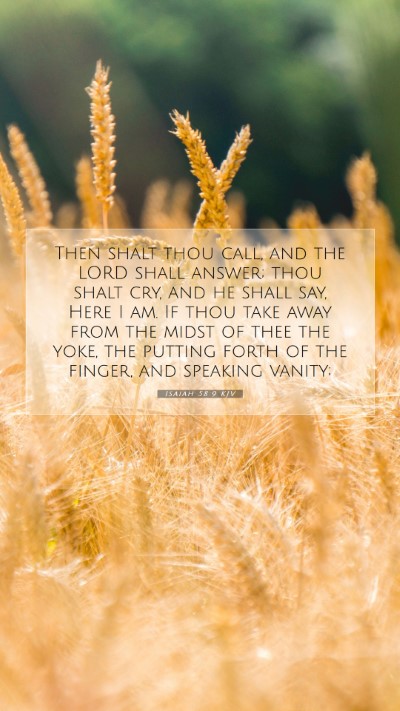Understanding Isaiah 58:9
In Isaiah 58:9, the Lord speaks to His people about the importance of true worship and the behavior that should accompany it. This verse states: "Then you shall call, and the Lord will answer; you shall cry, and He will say, 'Here I am.' If you take away the yoke from your midst, the pointing of the finger, and speaking wickedness."
Key Themes
- Your Relationship with God: This verse emphasizes that God is responsive to His people when they align their actions and hearts with His will.
- Social Justice: A major theme is the call to remove oppression and injustice—'the yoke'—which reflects a critical aspect of true worship.
- Integrity in Speech: The mention of 'pointing of the finger' and 'speaking wickedness' indicates that one’s words and attitudes must reflect godliness.
Bible Verse Meaning
This verse is often cited in the context of social justice and the idea that piety must extend beyond ritual to include ethical behavior. Matthew Henry emphasizes that genuine repentance and a desire for righteousness result in God's attentive response. He illustrates that when individuals cease complaining or speaking ill of others and instead act with kindness and justice, they invite God's presence and guidance in their lives.
Albert Barnes expands on this by noting that God's answer to prayer is contingent upon the believer's actions. If the people's behaviors are misaligned with God's commands—particularly regarding their treatment of others—then their spiritual rituals hold little meaning. He interprets 'the yoke' as a metaphor for oppression that God's people must actively seek to remove.
Adam Clarke adds depth to this phraseology, explaining that the 'pointing of the finger' denotes slander or accusation towards others, and warns against the hypocrisy of worshipping God while neglecting moral integrity. He calls attention to the practical application of faith, urging that one's external actions must be consistent with internal beliefs.
In-Depth Analysis
To truly understand Isaiah 58:9, several aspects should be contemplated:
- Historical Context: This chapter of Isaiah addresses Israel's failure to understand God's will and purpose for their lives—highlighting the disconnect between ritual observance and ethical living. Contextual interpretation suggests the Israelites were engaged in fasting and worship, yet failed to live out God's commandments.
- Spiritual Application: The verse serves as a critical reminder for contemporary believers to examine their lives—are their prayers met with God's promises due to unconfessed sins or unyielded hearts? The relationship with God is not one-sided; it requires active participation and alignment with His character.
Practical Application for Daily Life
Isaiah 58:9 is a guiding principle for individuals seeking to apply biblical teachings in daily scenarios. Consider these aspects:
- Self-Examination: Regularly evaluate your actions and responses in light of Scripture, ensuring your speech and activities reflect kindness.
- Advocacy for Justice: Seek to lift the burdens of others. Engage in practices that promote equity and justice within your community.
- Authentic Worship: Engage in a worship experience that flows from a heart cleansed of ill intentions and covetousness.
Cross References
- Isaiah 1:15-17: A call to restore justice and care for the oppressed.
- Micah 6:8: "What does the Lord require of you? To act justly, love mercy, and walk humbly with your God."
- James 1:27: A definition of pure religion as caring for orphans and widows.
Conclusion
In summary, Isaiah 58:9 serves as an essential reminder of the necessity of living a life that resonates with the character of God. It challenges individuals to look beyond mere rituals and focus on the deeper implications of their faith, urging them to embody compassion, justice, and integrity. By understanding this verse's meaning, believers can cultivate a life that reflects true worship, leading to profound spiritual fulfillment and an impactful presence in the world.


